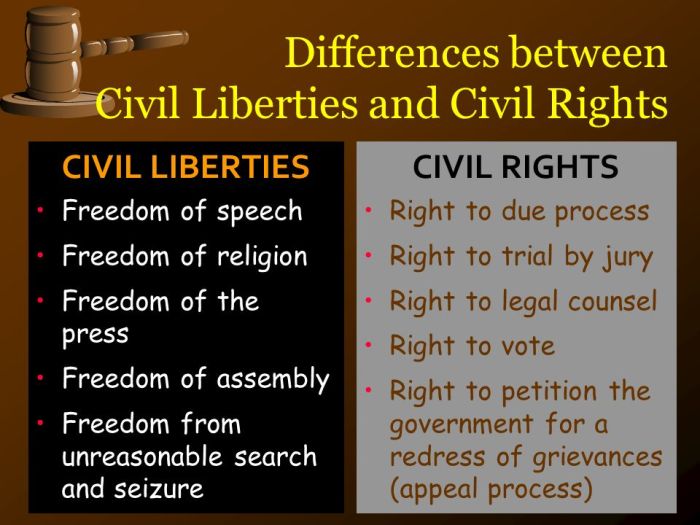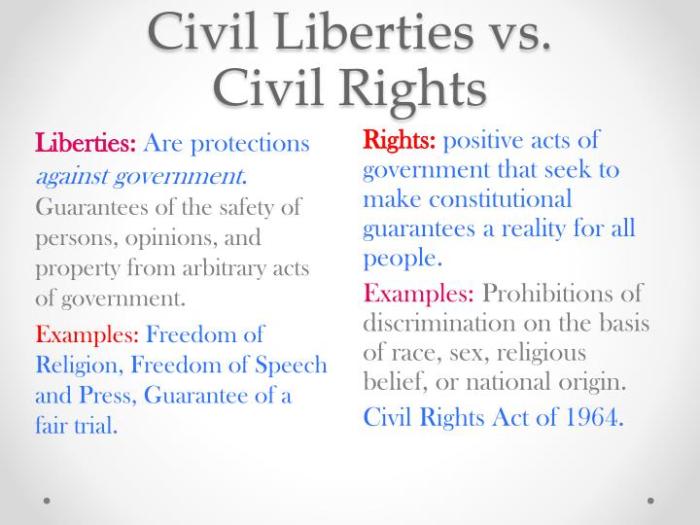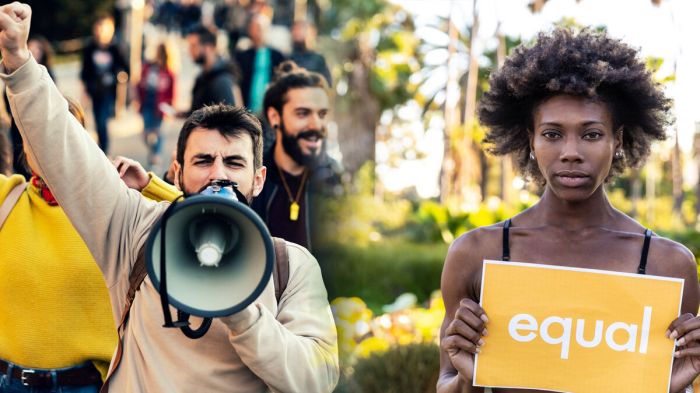Delving into the realm of ap gov civil liberties and civil rights, this discourse aims to illuminate the fundamental principles that safeguard individual freedoms and protect against governmental overreach. These concepts, deeply rooted in history and enshrined in legal frameworks, serve as the cornerstone of democratic societies, ensuring that citizens enjoy their inherent rights and liberties.
Throughout this exploration, we will delve into the various categories of civil liberties, including freedom of speech, press, religion, assembly, and petition, examining their scope, limitations, and the controversies that have shaped their interpretation. We will also explore the categories of civil rights, such as equal protection under the law, due process of law, and the right to vote, tracing their historical development and ongoing debates.
Civil Liberties and Civil Rights: Ap Gov Civil Liberties And Civil Rights

Civil liberties and civil rights are fundamental principles that protect the rights and freedoms of individuals within a society. Civil liberties refer to the freedoms that individuals have from government interference, while civil rights ensure equal protection and treatment under the law.
These concepts have their roots in historical struggles for individual rights and the establishment of democratic societies.The legal framework for civil liberties and civil rights in the United States is primarily based on the Constitution, particularly the Bill of Rights (Amendments 1-10), which guarantees specific freedoms and protections to individuals.
The Fourteenth Amendment also plays a crucial role in protecting civil rights by extending due process and equal protection under the law to all citizens.
Categories of Civil Liberties, Ap gov civil liberties and civil rights
Freedom of Speech, Press, Religion, Assembly, and PetitionCivil liberties include the fundamental freedoms of speech, press, religion, assembly, and petition. Freedom of speech protects the right to express one’s opinions and ideas, even if they are controversial or unpopular. Freedom of the press allows for the free dissemination of information and news without government censorship.
Freedom of religion guarantees the right to practice and express one’s religious beliefs without interference from the government. Freedom of assembly allows individuals to gather and protest peacefully, while freedom of petition grants the right to petition the government for redress of grievances.Each
of these liberties has its scope and limitations. For example, freedom of speech does not protect incitement to violence or threats of harm. Freedom of religion does not permit actions that violate public safety or morals. The courts play a vital role in balancing these liberties with legitimate government interests, such as national security or public order.
Categories of Civil Rights
Equal Protection, Due Process, and Voting RightsCivil rights encompass the fundamental rights of equal protection under the law, due process of law, and the right to vote. Equal protection prohibits discrimination based on race, gender, religion, or other protected characteristics. Due process requires that individuals be treated fairly and in accordance with established legal procedures before being deprived of life, liberty, or property.
The right to vote ensures that all citizens have the opportunity to participate in the political process and have their voices heard.These civil rights have been historically contested and expanded through legislation and court decisions. The Civil Rights Act of 1964 and the Voting Rights Act of 1965 were landmark laws that outlawed discrimination and expanded voting rights for African Americans.
Despite these advancements, challenges and debates surrounding civil rights continue to exist, particularly in areas such as racial profiling, affirmative action, and the rights of LGBTQ+ individuals.
Balancing Civil Liberties and Civil Rights
Tension and the Role of the CourtsCivil liberties and civil rights often present a tension between individual freedoms and societal interests. For example, freedom of speech may conflict with the need to protect national security or prevent harm to others. The courts play a critical role in balancing these competing values and determining the appropriate limits on individual liberties in a democratic society.Landmark
cases such as Schenck v. United States (1919) and Brandenburg v. Ohio (1969) have established important principles for balancing freedom of speech with the government’s interest in preventing imminent harm or unlawful activity. The courts consider factors such as the nature of the speech, the context in which it is made, and the potential for harm or disruption to society.
Civil Liberties and Civil Rights in the Digital Age
Impact of TechnologyThe digital age has brought new challenges and opportunities for civil liberties and civil rights. Technological advancements have raised concerns about online surveillance, data privacy, and hate speech. Governments and social media companies face the responsibility of protecting individual rights while maintaining public safety and security.The
Fourth Amendment, which protects against unreasonable searches and seizures, has been reinterpreted in the digital context to address issues such as government access to electronic data and location tracking. The First Amendment also faces new challenges in the online environment, as social media platforms grapple with balancing free speech with the spread of misinformation and hate speech.
FAQ Guide
What is the difference between civil liberties and civil rights?
Civil liberties are freedoms that are guaranteed to all individuals, while civil rights are protections against discrimination based on specific characteristics, such as race, gender, or religion.
What is the importance of civil liberties and civil rights?
Civil liberties and civil rights are essential for protecting individual freedoms, ensuring equal treatment under the law, and promoting a just and fair society.
How are civil liberties and civil rights protected?
Civil liberties and civil rights are protected through the Constitution, laws, and court decisions. The courts play a crucial role in interpreting these protections and ensuring that they are upheld.

